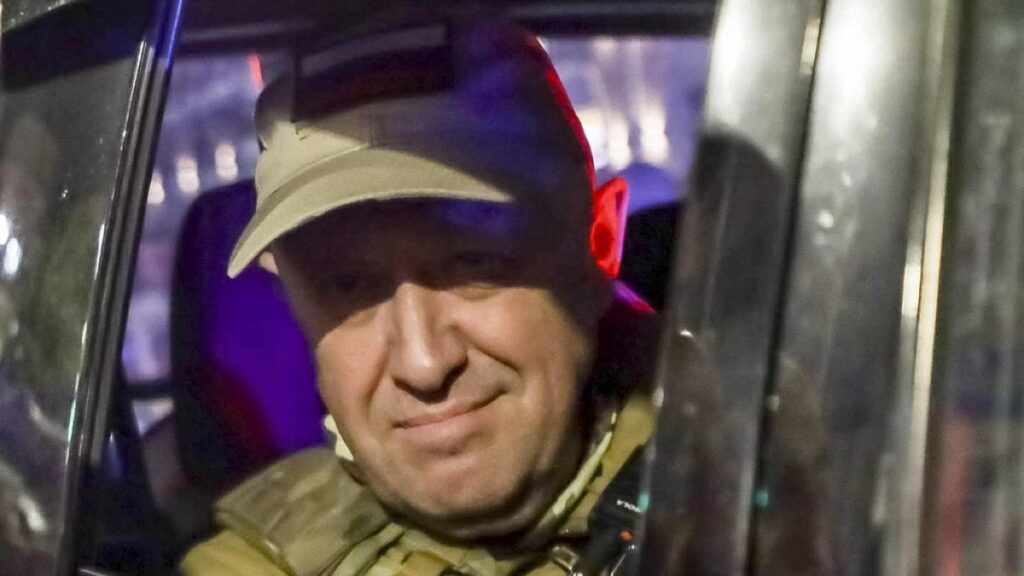A few weeks later, the leader of the mercenary group Wagner died in a plane crash.
A year ago, in the midst of the war in Ukraine, Russia was shaken by a rebellion. Evegeny Prigozhin, head of the Kremlin-backed mercenary group Wagner, seized a military headquarters in the south of the country and began marching toward Moscow to oust the leaders of the Defense Ministry, accusing them of deprived its forces of ammunition in Ukraine.
Evegeny Prigozhin and his mercenaries finally called off their “justice march” hours later, but the rebellion was a blow to President Vladimir Putin, the most serious challenge to his power.
Evegeny Prigozhin’s motivations are still hotly debated, and the plane crash that killed him and his top lieutenants exactly two months after the rebellion remains shrouded in mystery.
From restaurateur to military leader
Evegeny Prigozhin, a former prisoner, owned a chic restaurant in St. Petersburg where Vladimir Putin received foreign leaders. This earned him the nickname “Putin’s chef”. These connections allowed him to secure lucrative government contracts, including for Kremlin-hosted events and to provide meals and services to the military.
In 2014, Evegeni Prigozhin founded the Wagner Group, a private military group, which he used to promote Russia’s political interests and influence by deploying mercenaries in Syria, Libya, the Central African Republic and elsewhere. Wagner’s fighters provided security to African leaders or warlords, often in exchange for a share of gold mines or other natural resources.
Evegeny Prigozhin attracted attention in the United States, where he and a dozen other Russians were indicted by the Justice Department for creating the Internet Research Agency – a “troll farm” that focused over interference in the 2016 US presidential election. The case was later dropped.
Wagner’s role in Ukraine
After Putin’s invasion of Ukraine in 2022, Wagner emerged as one of Moscow’s most effective fighting forces. He played a key role in the capture of the eastern stronghold of Bakhmout in May 2023.
Evegeny Prigozhin was authorized by the Kremlin to swell Wagner’s ranks with convicts, who were granted amnesty after serving six months on the front line. According to him, 50,000 of them were recruited and 10,000 died during the fierce battle of Bakhmut.
The war reinforced Wagner’s reputation for brutality. In a video that surfaced in November 2022, a former Wagner mercenary who allegedly defected to the Ukrainian side, but was later captured by Russia, is seen being beaten to death with a mace, the group’s symbol mercenaries.
The aborted mutiny of June 23 and 24, 2023
For months in 2023, Prigozhin complained that the top brass was denying his forces needed ammunition in Ukraine. As part of an open political struggle, he criticized then-Defense Minister Sergei Shoigu and Chief of the General Staff General Valery Gerasimov in profane diatribes on social media , making them responsible for military setbacks and accusing them of corruption.
The Defense Ministry’s order for Wagner to sign contracts with the regular army appears to have been the final trigger for Prigozhin’s extraordinary rebellion on June 23-24.
His mercenaries quickly took control of the southern Russian military headquarters at Rostov-on-Don, apparently hoping to capture Shoigu and Gerasimov. But they weren’t there.
Evegeny Prigozhin then orders his forces to drive towards Moscow, claiming that this is not a military coup, but a “march of justice” to overthrow his adversaries. The mercenaries shoot down several military planes along the way, killing more than a dozen pilots. Moscow city security forces are put on alert and checkpoints are set up in the southern suburbs.
At the height of the crisis, Vladimir Putin spoke on television and described the rebellion of his former protégé as “treason”. He promises to punish the perpetrators of this rebellion.
But Evegeni Prigozhin abruptly interrupted the march a few hours later as part of an agreement negotiated by Belarusian President Alexander Lukashenko. Wagner’s mercenaries have the choice between settling in Belarus, withdrawing, or signing contracts with the Russian Ministry of Defense.
Wagner’s leader later said he started the uprising after “lost his temper” in internal struggles. Some observers believe he hoped to persuade Vladimir Putin to take his side against the military’s top brass. A serious mistake.
Death of Evegueni Prigojine in a plane crash
On August 23, two months to the day after the rebellion, a business plane carrying Evegeny Prigozhin, 62, and his main associates crashed in mid-air. All seven passengers and three crew members were killed in the accident between Moscow and St. Petersburg.
State investigators have not yet determined the cause of the accident.
A preliminary assessment by US intelligence services concluded that there was an intentional explosion on board the plane. Western officials recalled the long list of assassinated enemies of Vladimir Putin.
The Kremlin has denied any involvement and called “absolute lie” Western allegations that Vladimir Putin was behind the accident.
Evegeny Prigozhin was buried in his hometown of Saint Petersburg in a private ceremony.
Wagner’s sequel
Several thousand of Wagner’s mercenaries were transferred to a camp in Belarus after the mutiny. Shortly after the death of Yevgeny Prigozhin, most left this country to sign contracts with the Russian army with a view to redeployment in Africa or a resumption of fighting in Ukraine. Only a handful of them remained in Belarus to join its army.
Russian authorities created a successor to Wagner, Africa Corps, and used it to expand military cooperation with regional countries. Moscow has become the security partner of choice for a number of African governments, to the detriment of traditional allies like France and the United States.
Elements of Wagner and other private security companies continue to operate in Ukraine under the control of the Defense Ministry and the Russian National Guard.

